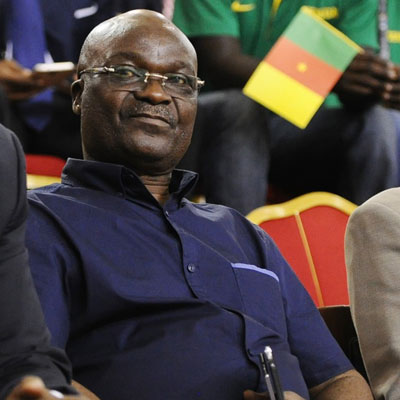
Interview with international football legend Roger Milla

In a bid to inspire a young breed of ambitious footballers worldwide and provide them with useful advice that might enable them to stamp their mark on the pitch and possibly for years to come, the legendary Milla explains how his career was mapped out from a Cameroonian point of view as well as speculating on the perceptions and expectations of the rest of the competing nations.
Only the most gifted footballers are remembered decades after their glory years have passed, and Milla is one of them. Former manager of the Cameroonian national team, Claude Leroy, used to refer to Milla as “a diamond” –and this seems an appropriate epitaph for a scintillating career: on the pitch, Milla certainly sparkled. He was one of that peerless breed of football players who could be struck by a moment of ingenious manoeuvre and thereby change the outcome of a match seemingly in the blink of an eye.
Milla’s legacy was mapped out during the 1990 World cup: one only need remember the nail-biting quarter-final match against England in the sweltering summer heat of the 1990 World Cup in Naples, Italy, also known as Mundiale 90 –the seminal match that first brought to the world’s attention the formidable talent and agility of African football.
Remember that moment when Roger Milla ran past Colombian goalkeeper Jose Higuita after stealing the ball from him on his way to scoring a goal on June 23rd 1990? Many people do: it is still rated among the top ten iconic moments in international football.
The world was taken by storm, not just because Cameroon won, but also because an allegedly ‘unbeatable’ Argentinian football squad was unable to score one single goal against an unrecognised side who had never won a single game in the World Cup before.
The Argentines, led by Diego Maradona, were hugely criticised after that defeat, and strangely, the game was widely perceived to be ‘Argentina’s defeat’ rather than ‘Cameroon’s victory’.
Milla admitted himself that:
“1990 was an unforgettable experience. I realised after the tournament what an impact we’d had on people.”
As predicted by Milla indeed, the impact after the tournament was beyond belief: Africans football clubs have been taken very seriously since. This certainly explains why they always had the support of FIFA president Sepp Blatter himself.
On 26th October 2013, Mr Blatter who wanted more places at the World Cup for African and Asian countries said:
“From a purely sporting perspective, I would like to see globalisation finally taken seriously and the African and Asian national football associations accorded the status they deserve at the FIFA World Cup.”
Also famous for the longevity of his agility and energy, the seemingly ageless Milla’s career lasted almost four decades.
Nowadays, he still holds the records for being both the World Cup’s oldest ever player and oldest ever goal scorer—having scored against Russia in 1994 at the remarkable age of 42 years and 39 days.
As a result, Milla has remained a very active personality since his retirement from the football pitch. According to a recent report, the star foundation Coeur D’Afrique (The Heart of Africa) has teamed up with the University of Wolverhampton (UK) in a bid to improve the education of underprivileged children in Cameroon by opening a new multi-media centre in Yaoundé, with Milla as its ambassador.
1) Your skill and agility on the football pitch always seemed so effortless - what was your secret?
A sportsperson in general and a footballer in particular, has to be focused: he should train regularly and steadily in order to stay in shape, and should also keep an eye on his diet.
A professional footballer should be committed; devoted to his team-mates and his manager; he should show resilience and discipline. He should also comply with the team rules and regulations and follow his manager’s advice. I have always stuck to those rules –that is the reason why I still feel good in my own skin a decade after.
2) Let us go back in time: what were you feeling, what was going through your mind, at that precise time when you scored the golden goal against England. That historic goal that put the Cameroon national football team - the first African team - on the international map?
I did my job, just like many other footballers who were there to represent their nations. I was there to put my heart into the game, to play and score as many goals as possible, and bring the Cameroon national team as far as possible in the competition. I was passionate about what I was doing.
3) Cameroon was so close to winning that vital match against England, but then suddenly, almost in the blink of an eye, it turned into a penalty shootout. What do you think went wrong?
To be honest, at that stage, we were proud enough to have embarrassed and given a hard time to a great nation of football such as England with 1-1 as a score. The referee then ordered two penalty shoot outs, which were highly controversial at the time, and still remain controversial right up to today in the minds of high- ranking specialists in the field. Anyway, it is football after all, that is the way it is: the outcome of a game is hardly predictable.
4) Do you have any advice to give to young footballers today who aspire to a world-class career?
Aspiring world class footballers should be committed; they should follow the rules, work hard, train hard, have a teamwork attitude, keep themselves updated with football-related issues, agendas, sport news and other updates. Their manager and team-mates must be able to trust and rely on them. They should always make themselves available to their manager and their team-mates.
5) You have a formidable record under your belt: you played in three World Cups for the Cameroon national team, and you have also recently been appointed an Itinerant Ambassador in Cameroon, something that seems all the rage at the moment. Do you have any advice for the Cameroon national team?
Not particularly: most of the Cameroon football squad are international professional footballers playing for top league football teams from around the world – France, England, Germany and elsewhere.
There is not specific advice to give to professional footballers: they know their homework. Also, it is down to their managers to provide them with professional advice. However, these are no doubt the expectations of the entire nation of Cameroon.
6) Since 1990 things has not improved that much for Cameroon. The Cameroon football squad of 1990 set the tempo, but subsequent Cameroon national sides seem to have got out of step somehow. What do you think has gone wrong?
It is down to a lack of ambition. Cameroon lack of ambition – it is beyond belief. If a team has once reached a competitive level such as the World Cup quarter-final, it is not enough reason to be complaisant, to sit there and keep singing of old glories. Things move fast, so does football, so do football teams, players and rules. We former players of the Cameroon national side played our hearts out to secure a respectful place for the team, but the younger generation of footballers are not thinking about giving back to the future generation of players the legacy they inherited themselves. What are they going to pass on to the next coming generation of footballers if they stop believing in the game and playing their hearts out to reach their goal?
The Cameroon Federation of Football itself, whose aim was initially to improve the rules, and motivate and promote a young generation of players, has done nothing to improve things to the best of its ability.
Alors ne perdez plus de temps, inscrivez-vous sur un bookmaker licencié 1xBet qui propose des cotes élevées, paiements rapides, bonus variés et qui est toujours loyal envers ses parieurs.
Visiter le site Lire la revue
À lire aussi
Ce lundi, Ambre Godillon a fermement critiqué le harcèlement en lig...
Mise à l'écart de l'équipe française pour les rencontres face à Isr...
Ce lundi, le Stade Rennais a déclaré l'arrivée de Jorge Sampaoli co...
Au milieu de diverses rumeurs sur son potentiel intégration dans le...








